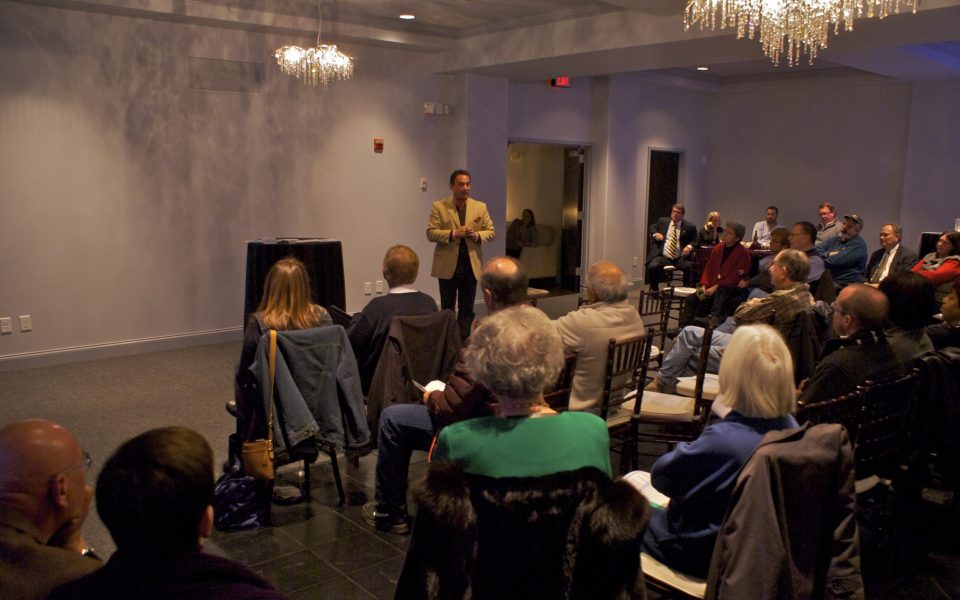by Eric Ginsburg
City officials share their plan to curb violence in downtown Greensboro and hear from residents with a slate of ideas for addressing the issue.
Just one week after the first community meeting, organized in the wake of a shooting and murder in downtown Greensboro, it appears outrage from stakeholders has somewhat dissipated.
At a second community meeting organized by Downtown Greensboro Inc. and the Downtown Residents Association on Nov. 19, fewer people turned out than at a swiftly assembled meeting the week before, and those who came mostly had cooler tempers.
Dozens of people attended the meeting to hear from city leaders about plans to address and prevent violence downtown, and a few shared their ideas for what needs to be done. In a new, swanky, fourth-floor event space at the Kress Building, a group of mostly downtown residents and business owners enjoyed catered snacks and listened to updates from city leaders about plans put in place at a city council meeting the night before.
Standing at the front of the posh room, Mayor Nancy Vaughan outlined a “lights, camera, action” plan that calls for increased temporary lighting, new and well-marked surveillance cameras and possible revisions to the city’s entertainment facility use ordinance.
The city will discuss the ordinance, which places additional restrictions on clubs and was championed by Councilman Zack Matheny, at a Dec. 2 public hearing. There are several proposed changes to the ordinance on the table, the most significant being one that would require venues with occupancies of 100 or more to hire two uniformed and armed security guards.
Matheny — one of six council members in attendance at the meeting, in addition to Guilford County Commissioner Jeff Phillips — said the guards could be private security or off-duty police officers. It could add up to 16 armed personnel protecting downtown, he said.
The city probably should have put in a stronger ordinance in the first place, Matheny said, but he admitted fault in how the law was crafted.
“I screwed up,” he said. “I went hard and went too fast and wanted too many things.”
The end result, Matheny said, was a watered-down ordinance with too many compromises.
Since the Nov. 19 meeting, the city set up temporary lights downtown as a stop-gap measure until better, more permanent lighting can be installed, but Vaughan emphasized that any approach needs to extend beyond the city’s core.
“While it was started by a downtown issue, it has to really be citywide,” she said.
There hasn’t been a higher rate of violence downtown, related to clubs or otherwise, in the last year, Vaughan said, but using statistics isn’t exactly an easy sell to downtown residents and business owners. Still, she said, it is important to note that violent incidents are minimal downtown and that with limited resources, the city cannot pull too many officers away from other areas.
That’s part of the reason Vaughan is championing surveillance cameras in hotspots downtown, an approach she has previously viewed with skepticism. With well-marked cameras in key locations, Vaughan said, she believes the city can deter some criminal activity, particularly in conjunction with better lighting and ordinance changes aimed at nightclubs.
Attendees offered an assortment of ideas for addressing downtown violence, including providing free popcorn at late-night venues to help people sober up, closing down Elm Street on Friday and Saturday nights or banning certain individuals from the area. A downtown resident suggested using zoning restrictions to push out unwanted clubs while another attendee asked about the potential for changing concealed-carry laws.
A couple speakers cautioned against becoming too restrictive, emphasizing that the city depends on appealing to college students and others as a cool destination and noting that it is impossible to create a city free of any violence.
Piggybacking on a comment from interim police Chief Anita Holder, who said, “We truly have not seen an issue with violence in clubs,” developer and property owner John Lomax took the opportunity to argue that violence is often coming from people loitering and not at clubs. Lomax suggested that police automatically detain anyone ejected from a club for fighting to question them about the incident, holding them for long enough that the initial issue is diffused. He also proposed stricter loitering laws to keep troublemakers moving.
The city took immediate action in the wake of the shooting downtown earlier this month that left four people injured and a fourth dead, including increased police presence by adding “four additional resources,” City Manager Jim Westmoreland said.
On Monday, Greensboro police said Leonardo Vences was arrested and Gosafat Rodriguez is still at large in connection to the shootings. Both men are from Asheboro, police said.
Moving forward, police will react more quickly to push people who are causing problems out of downtown, and not give “much warning in terms of correcting behavior,” Westmoreland said.
On a handout given to attendees as they walked in, the city also said the increase in uniformed police presence would remain in place until mid January.
Other than a couple of tense moments, the meeting remained mostly congenial, though a few attendees vehemently disagreed about a few superfluous suggestions. That could mean people didn’t feel as strongly as folks who showed up to the preceding meeting, in which many expressed strong frustration and dissatisfaction with the city. But it could also be a sign that some people will accept the city’s planned changes as sufficient progress.
Join the First Amendment Society, a membership that goes directly to funding TCB‘s newsroom.
We believe that reporting can save the world.
The TCB First Amendment Society recognizes the vital role of a free, unfettered press with a bundling of local experiences designed to build community, and unique engagements with our newsroom that will help you understand, and shape, local journalism’s critical role in uplifting the people in our cities.
All revenue goes directly into the newsroom as reporters’ salaries and freelance commissions.


Leave a Reply